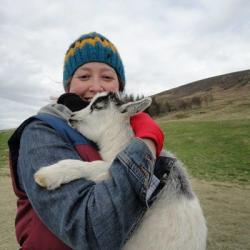
Harriet Cardew, a ten-year-old Icelandic girl from Kópavogur, was denied a passport because the National Registry will not recognize her name.
Harriet Cardew, a ten-year-old Icelandic girl from Kópavogur, was denied a passport because the National Registry will not recognize her name, Vísir reports. Harriet is the daughter of an Icelandic mother and British father—Kristín and Tristan Cardew. She and her eleven-year old brother Duncan are currently listed as Stúlka and Drengur Cardew—Girl and Boy Cardew—in the National Registry because their names have not been approved by Iceland’s naming committee.
“This has deprived our daughter of her freedom of movement,” her mother stated. “It is in violation of the United Nations’ Convention on the Rights of the Child.” The family—including siblings Lilja and Belinda, whose names have been approved by the Naming Committee—has planned a trip to France next week, but were just told by the National Registry’s lawyers that the office is “cleaning out” all individuals who are currently listed as “girl” or “boy” in the official records, and as such, that a passport would not be issued for Harriet (no word on whether one will be issued for Duncan, incidentally).
It seems that no one bothered to tell Harriet’s parents about this new policy. “What’s strange is that employees at the National Registry or District Commission of Kópavogur could easily have let us know that Harriet would be denied a passport,” Tristan stated, explaining that they simply would have applied directly to the British embassy for a permanent one had they known this would be an issue. Instead, following the National Registry’s refusal to issue Harriet a passport, her parents had to request an emergency passport from the British embassy so that their daughter can travel to the UK and be issued a permanent one there.
“If we were both foreign, our children could bear foreign names,” continued Kristín. “They could also bear foreign names if they had Icelandic first or middle names.”
This is, of course, not the first case in which the National Registry has refused to recognize a child’s rightful given name. The most high profile case to date has been that of Blær Bjarkardóttir Rúnarsdóttir, who was officially registered as “girl” for the first fifteen years of her life. After a prolonged court case, she won the right to be officially recognized by her name in February 2013. In December of that same year, parents of three-year-old Reykdal Máni Magnússon won their own case against the Naming Committee. For their part, the Cardew family has sent a letter to the children’s omsbudsman and are speaking to a lawyer about whether the National Registry’s passport denial is lawful.
Iceland’s naming law has come under increasing fire over recent years, with former Reykjavík mayor even posting about them on his Facebook page: “It’s just unfair, stupid law against creativity.”
Buy subscriptions, t-shirts and more from our shop right here!

















